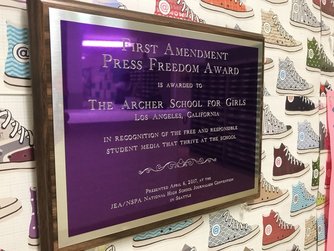 My school's 2017 First Amendment Press Freedom Award hangs on the way in the upper school. Allowing students final editorial say in all content provides them with a real citizenship experience, but it also means adults letting go of the urge to shield and protect and instead empowering their voices. My school's 2017 First Amendment Press Freedom Award hangs on the way in the upper school. Allowing students final editorial say in all content provides them with a real citizenship experience, but it also means adults letting go of the urge to shield and protect and instead empowering their voices. Teachers and administrators want to help our students. We want to give them the tools to succeed, but we also sometimes want to protect them — to shield them from harsh truths and difficult situations. When I'm teaching my journalism students about the social role of the mass media and their own societal role as young journalists, I also think a lot about my role as their adviser. I argued earlier this year that if we want students to value citizenship, we must let them be citizens, but citizenship isn't easy, and it isn't "safe." Citizenship means taking an active role, speaking truth to power, and taking risks. If I want them to learn to be citizens, I must resist that urge to shield and protect and instead empower them to make their own decisions and take responsibility for the outcome.
0 Comments
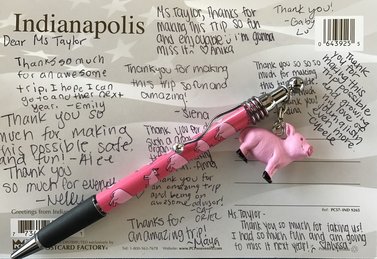 My publications students gave me this postcard after we attended the fall National High School Journalism Convention in Indianapolis. Conventions like this bring students who are already engaged in journalism together, but how can we get the rest of the school excited? My publications students gave me this postcard after we attended the fall National High School Journalism Convention in Indianapolis. Conventions like this bring students who are already engaged in journalism together, but how can we get the rest of the school excited? I wish journalism was a required core subject. I wish we could help every high school student dive into the process and joy of determining what is newsworthy, learning what constitutes good reporting versus repeating rumors, developing the confidence to interview adults and peers and ask hard questions, considering the foundational pillars of ethical journalism, writing and editing and editing and editing and proofreading until an article is truly clear, and learning all the other skills and ways of thinking that happen naturally when a student is actively engaged in news-production. Since every student at the school can't be on staff, however, how can we get the rest of the school engaged in news? 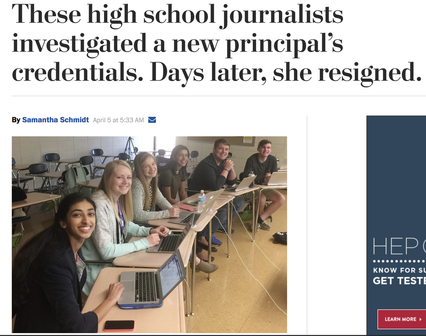 A screenshot of the Washington Post story about the team of student reporters who uncovered the truth about their new principal. A screenshot of the Washington Post story about the team of student reporters who uncovered the truth about their new principal. I woke up this morning to multiple social media notifications from friends tagging me to make sure I saw this story in the Washington Post. The article details how a group of six student reporters for the Booster Redux at Pittsburg High School in southeastern Kansas started researching their new principal and uncovered some major discrepancies in her educational record, which eventually led to her resignation. You can (and should!) read the story for specific details about what they uncovered, but for me the story reaffirmed how crucial it is for students to be empowered to be investigators and watchdogs, not just public relations tools. 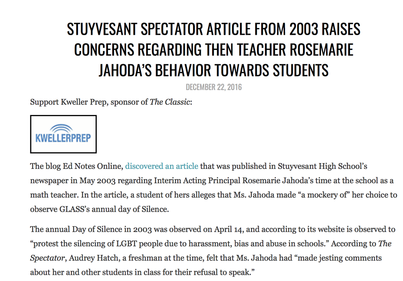 A screenshot of one of the stories reported by Townsend Harris High School's student newspaper, The Classic. Acting as watchdog journalists, these student journalists have written a series of stories about the controversy surrounding the school's interim principal, Rosemarie Jahoda. A screenshot of one of the stories reported by Townsend Harris High School's student newspaper, The Classic. Acting as watchdog journalists, these student journalists have written a series of stories about the controversy surrounding the school's interim principal, Rosemarie Jahoda. One of the most important roles of a free press in a journalistic society is to act as a watchdog, to keep an eye on those in power and to ensure that power is not being misused. Although this role is more prominent among professionals, student journalists willing to put in the necessary time and research can be powerful watchdogs for their communities. In his Poynter article "Watchdog Culture: Why You Need it, How You Can Build it," Butch Ward describes a 2005 conference for media professionals and public service journalism organizations about the importance of creating a watchdog culture in newsrooms. 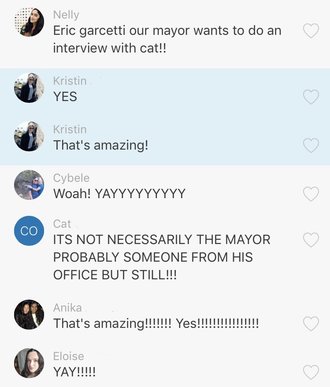 This screenshot from a GroupMe message exchange with my student editors earlier this week is giving me life. It happened after one of them secured an interview with LA Mayor Garcetti's office to talk about the recent low voter turnout for the LA municipal election. This screenshot from a GroupMe message exchange with my student editors earlier this week is giving me life. It happened after one of them secured an interview with LA Mayor Garcetti's office to talk about the recent low voter turnout for the LA municipal election. Journalism isn't sexy anymore. That's the concern I hear from many when contemplating the future of this crucial profession. Veteran reporter and editor Bob Collins wrote about this problem in a 2012 News Cut piece for Minnesota Public Radio. Collins remembered a time when aspiring young journalists flooded NPR World Headquarters, eager to explore a career in news, and he contrasted this to reporter Trisha Marczak's experience going to a high school career fair and finding not a single student interested in her work. "I at least expected to meet one eager, young student with their eyes set on changing the world through their pen (that’s how I felt at that age)," Marczak writes. "Don’t these students watch movies? You have to admit; reporters are a movie character favorite. They may not always be small town editors, but you get the idea. Throughout the day, when explaining to students what I do, exactly, I also began to ask whether any of their schools had student-run newspapers. Not one." And this, I believe, is the problem. How do students get interested in careers? Exposure. |
About“And though she be but little, she is fierce!” -A Midsummer Night’s Dream Archives
December 2020
Categories
All
|

 RSS Feed
RSS Feed